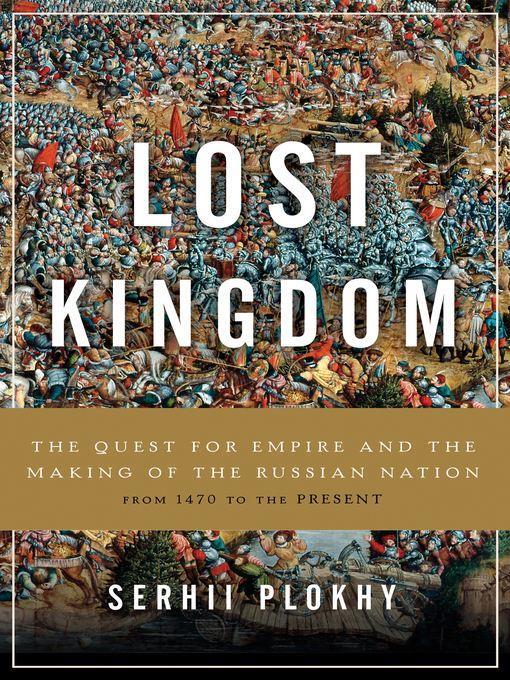
Lost Kingdom
The Quest for Empire and the Making of the Russian Nation
- اطلاعات
- نقد و بررسی
- دیدگاه کاربران
نقد و بررسی

Starred review from August 21, 2017
Plokhy (The Man with the Poison Gun), director of Harvard’s Ukrainian Research Institute, eloquently relates the historical ebbs and flows of Russian nationalism and imperialism. Condensing more than six centuries into 20 well-focused chapters, Plokhy shows how Russia has invented and reinvented itself, beginning with Ivan III, who in the 15th century claimed the title of ruler of “all Rus’ ” upon defeating the Mongol khans. Myth played a major role in establishing the early czars by linking them to the “Scandinavian Rurikid dynasty,” which successfully ruled Kyivan Rus’—territory that roughly includes present-day Western Russia, Belarus, and Ukraine—from 980 to 1240. Plokhy suggests that Russia’s preoccupation with this legacy became a persistent national headache, requiring many refabrications over several centuries and leading to many territorial conflicts. He describes how imperial leaders used these conflicts, as well as language and religion, to dominate other Slavic and non-Slavic peoples and lands. His coverage of the Russian revolution and the Soviet era includes a fascinating chapter on Stalin and the Kyivan myth, and he surveys the post-Soviet resurgence of nationalism. Plokhy’s thorough historical analysis places President Vladimir Putin’s 21st-century foreign policy in a firm historical context. Maps. Agent: Jill Kneerim, Kneerim & Williams Literary.

August 1, 2017
A timely work of impeccable research that elucidates the Russian impulse toward regaining lost lands under a powerful myth of origins.With Russia having recently moved aggressively into Ukraine and Crimea, the history of Russian nationalism is worth revisiting. In this deeply detailed history, Plokhy (Director, Ukrainian Research Institute, Harvard Univ.; The Gates of Europe: A History of Ukraine, 2015, etc.) recognizes 15th-century ruler Ivan III as the self-declared scion to "all Rus" lands, retaken after challenging the Mongol khans. Ivan also made the first connection as heir to Byzantium by marrying the niece of the last Byzantine emperor. Ivan declared his sovereignty over the lands of Mongol Rus, which included not only Moscow, but extended to the Grand Duchy of Lithuania. As the Orthodox Church consolidated its holdings, Ukraine and Belarus were incorporated into the Commonwealth, instigating the terminology "Great" and "Little" Rus, while " 'White Rus' (Belarus) was added to the tsar's title in 1655." These reflected the political upheavals in the region and gave the Muscovy elite the first sense of themselves as a true nation. Peter the Great's victory at Poltava in 1709, as well as subsequent victories, helped him to control "the national discourse, with its emphasis on the fatherland, the nation, and the common good." Indeed, in 1721, he received the appellations "All-Russian Emperor" and "Father of the Fatherland." Plokhy pursues the flimsy cohesion of this "tripartite nation" over the subsequent centuries, as Ukraine's sense of selfhood and distinct language emerged primarily in the mid-19th century, challenging the official Russian version of nation and state. During the Revolution of 1917, Vladimir Lenin, unlike Stalin, rejected the "great-power chauvinism" of a Russian Federation of states. Lenin was in favor of allowing Ukraine to branch off as a distinct entity, while Stalin's subsequent "indigenization policy" was soon reversed as it collided with political repression. A dense history that may lose readers not versed in Russian history, but for students and scholars, Plokhy continues to show that he is the master of this terrain.
COPYRIGHT(2017) Kirkus Reviews, ALL RIGHTS RESERVED.

September 15, 2017
In his latest work, Plokhy (history, Harvard Univ.; The Last Empire: The Final Days of the Soviet Union) offers readers a better understanding of modern Russia by reviewing the country from its early years to the present. The author provides an in-depth look at different eras in Soviet history, from Mongolian rule in the 1400s to the pivotal revolution in the 20th century. Along the way, he connects the motives and behaviors of past rulers Vladimir Lenin and Joseph Stalin to those of current president Vladimir Putin. The narrative connects Russia's rich past to today's political and social climate and uses this history to provide context for the nation's relationships with Crimea and Ukraine. Notably, the author offers insight into the motivations of the present administration and shape of the region. Plokhy explains how other countries have moved on from the desire to create and maintain empires while Russia continues to focus on re-creating its romanticized past. VERDICT Recommended for anyone who enjoys world history, particularly relating to Russia or Eurasia.--Sonnet Ireland, St. Tammany Parish P.L., Mandeville, LA
Copyright 2017 Library Journal, LLC Used with permission.




دیدگاه کاربران